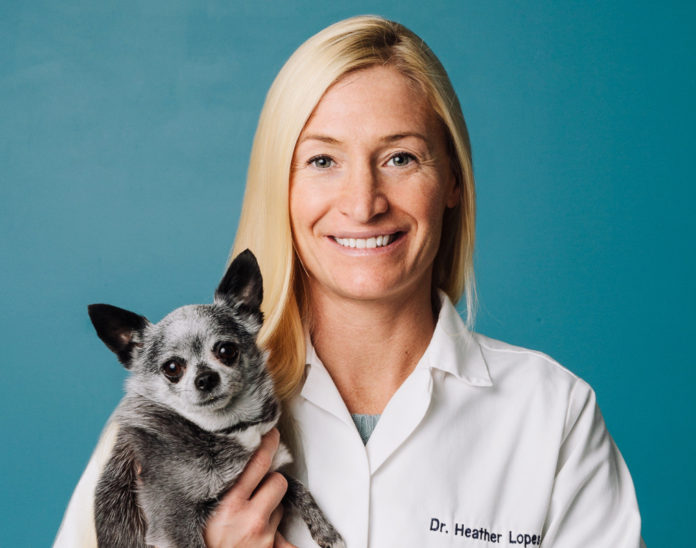
Dr. Heather Lopes, a veterinarian at Washington County/South County Veterinary Hospital in the Wakefield section of South Kingstown, was recently named president of the Rhode Island Veterinary Medical Association. She has served as a member of the nonprofit organization since 2011. Lopes is a small-animal veterinarian with a focus on feline, internal and preventative medicine. Along with a deep commitment to community service through providing low-cost rabies vaccinations for low-income pet owners, Lopes has been an active advocate in encouraging people to take their pets to the veterinarian for routine exams and care.
PBN: This is your 10th year practicing veterinary medicine. What inspired you to enter the field and what type of satisfaction do you get from your work?
LOPES: I know this sounds cliche, but I have always felt a calling in the field of veterinary medicine – even as a small child. Most days I wake up and look forward to going to work. I enjoy the challenge each day brings and the opportunities I have to make a difference in animals’ lives. I also love the one-on-one communication with clients and educating them on their pet. And, of course, I thoroughly enjoy my patients.
PBN: For those who may be unfamiliar, what is the R.I. Veterinary Medical Association and what is the focus of its work? When did you first join its board of directors?
LOPES: RIVMA is a nonprofit organization comprised of 200-plus Rhode Island veterinarians. We are dedicated to advancing the science and art of veterinary medicine, including its relationship to public health and agriculture. The organization does this by providing training and education to veterinarians and technicians annually. As president, I am committed to ensuring that as many people as possible can access veterinary care and are encouraged to do so.
PBN: As a veterinarian, what is the most important message that you would share with pet owners?
LOPES: It is essential to focus on wellness for pets and to ensure that they visit the veterinarian twice a year. I recognize that there is a wealth of information these days, from Google to pet stores, breeders, groomers, rescue organizations and more, however, a complete physical examination by a licensed, trained veterinarian is crucial to providing the best medical care for your animal. This ensures pets remain well and are less likely to need treatment for disease or deferred care. For instance, many small-breed dogs and aged cats are prone to severe dental disease. If left unaddressed or untreated, the disease can lead to infection or disease in other, more vital organs. Therefore, preventative medicine is much more likely to identify such conditions and address them appropriately – hopefully before permanent damage has been done.
PBN: In early March, a report on NPR released by two New York scientists who study Lyme disease predicted a drastic uptick in incidence this coming summer. What do pet owners need to know?
LOPES: Unfortunately, living in Rhode Island we know all too well the consequences of Lyme disease – both in our beloved canine/equine companions, as well as ourselves. My best advice is to use a veterinary-recommended-and-prescribed tick prevention on all pets in the household, have an annual Lyme vaccination administered to your dog(s) and do adequate “tick checks” daily on your pet(s). If you live in a densely-wooded area or are in contact with wildlife frequently, contact a local pest-control company and ask if having your yard treated is the right option for you. The higher level of protection you offer your pets will ultimately help protect you and your family as well. Finally, if you do find that you or your animal is exposed to ticks and you suspect you or your animal may be ill, contact the appropriate medical professional and get tested immediately. Early diagnosis and treatment for the disease is your best chance at fighting off the infection.
PBN: We often hear stories of animal neglect when owners are no longer able to care for them. Before this happens, what can a pet owner do to ensure the best outcome for themselves and their pet?
LOPES: There are many organizations available that are dedicated to the care and prevention of animal neglect and abuse. I encourage all individuals to contact their veterinarian as well as any of these organizations if they feel they can no longer care for their family pet. With this large network of animal welfare advocates, someone will be able to provide the care and assistance you are seeking. If you suspect abuse or mistreatment or are concerned for the safety of an animal, your local animal control officer should be contacted.
Emily Gowdey-Backus is a PBN staff writer.












